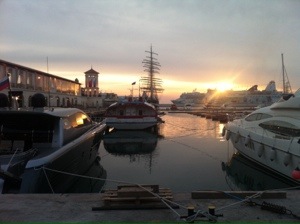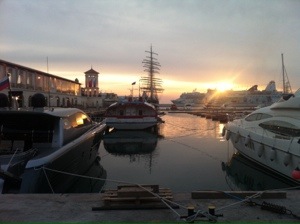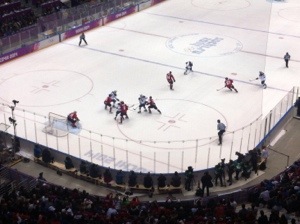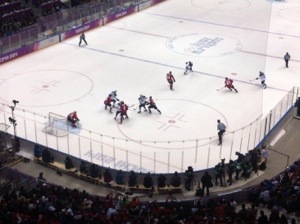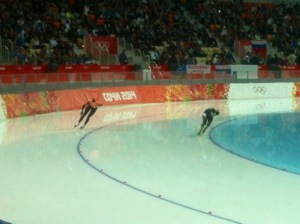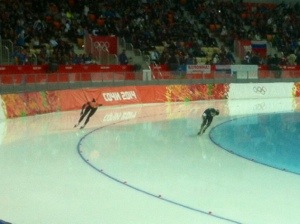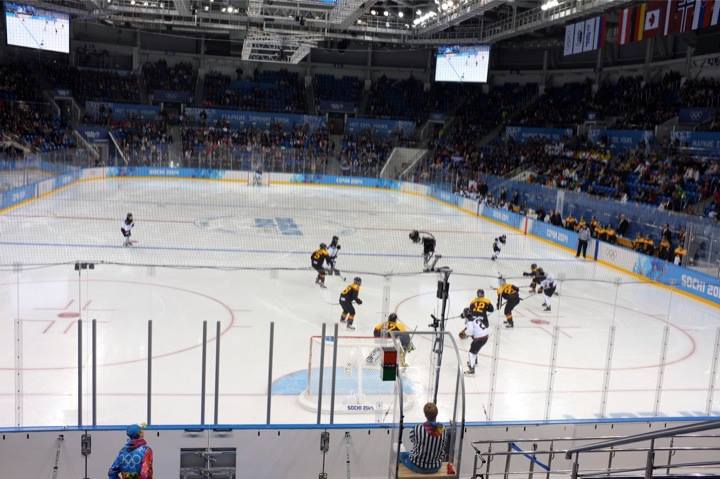I know, I know, you thought I was done writing about the Olympics. I thought I was too but something has been bothering me in the nether-reaches of my brain. I’m disappointed in how the Western media portrayed Sochi in the lead up to the games. Before I went, I was concerned and scared from what I had been reading. The hotels were unfinished, radioactive shitholes. There were suicide bombers on every block and even if the Russian Army were somehow able to deter or demolish them, the people living in the area would be overwhelmingly resentful because of having been forced to live under martial law for months before the Olympics even began. Oh, and any food in the area would have been in storage for at least three months because that was the last time any shipments of anything were allowed into the area.
With the possible exception of terrorism, this simply wasn’t true. None of it. There were reasonably fresh tomatoes and cucumbers at breakfast every morning that clearly had not been stored for three months. The people I met and even those I passed on the street seemed generally happy to show their neighborhoods to the world. I did sense and enjoy a little bit of, how do I describe it, self-deprecating humor in their enjoyment? Sochi and the surrounding area isn’t a perfectly curated resort, indeed, it’s probably not even all that well run, and I think the people who I ran into we’re a little amused that the world had descended on them. Either it took a Jersey boy to identify this in them or I was projecting.
I am certain that some of the hotel accommodations did have serious issues. By no means am I saying that the journalists and athletes who were there before the games began were falsifying their tweets and pictures showing yellow water, oddly designed toilet facilities, and other bizarre oddities. There were some hoaxes (apparently Jimmy Kimmel had something to do with the photo of a wolf inside a hotel) but the larger problem was twofold. First, people have a really hard time understanding that something that happens to one person in a large group is as rare as it is. This is one of the reasons why an act of terror that kills a few people can scare so many (more on terrorism in a minute, but this is equally true of a traffic accident, a murder, a lightening strike.) Second, the media clearly benefited from exaggerating or embellishing these stories and encouraging people to take them seriously. There’s an old saying in newspapers, “if it bleeds it leads.” In this case the most direct approach to driving general interest in a group of sports with only fringe followings was to gleefully project disaster.
Before the games, I took the terror threat quite seriously and I still do today. The tricky thing for anti-terrorism forces is that the only evidence of their work is negative. If they mess up, even once, everyone knows. If they succeed, the natural reaction for onlookers like me is to say that the threat was overblown and there’s simply no good way for them to advocate for themselves. Most of the time, if an attack is prevented, publicizing it will be a bad idea because it would compromise intelligence sources or gathering methods. So, let’s leave this one for historians to decide.
The problem is that people stayed home. That’s not a big deal if they were fans, (although one of the real problems with Olympic Games is that they cost so much and bring in so little, so any loss in profit is bad for the host country and eventually bad for the Games themselves,) but it is a big deal for a parent, sibling, child, or partner of an athlete to miss seeing them in person. The Olympics only come once every four years and qualifying next time is no lock. What a shame to miss out on that so that television stations can grab a few extra eyes and newspapers can sell a few more editions.

